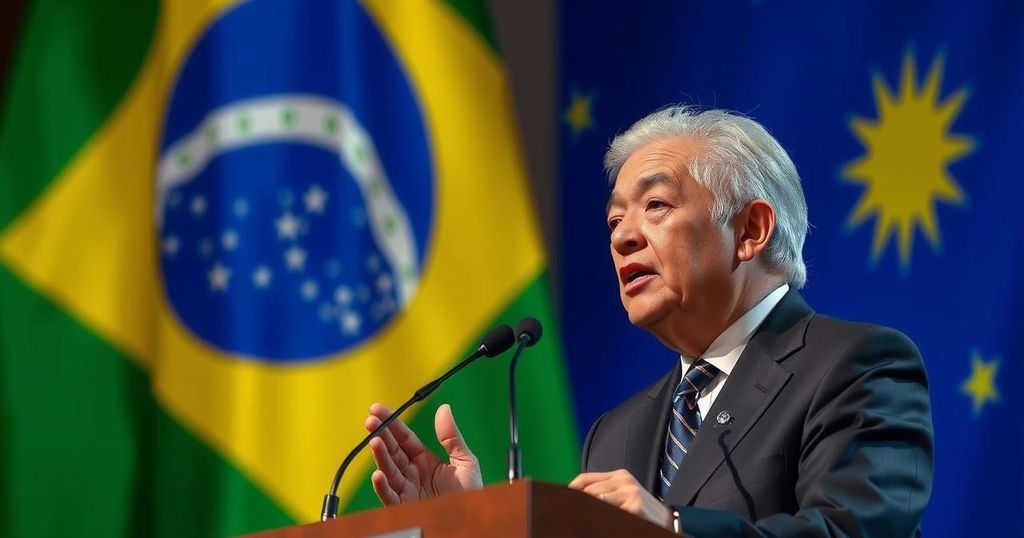Lula Launches Global Initiative to Combat Poverty at G20 Summit

Brazilian President Lula opened the G20 Summit by launching a global alliance against poverty and hunger, emphasizing the political roots of these issues, alongside a call for action on climate change. Despite the participation of 81 countries, including nearly all G20 members, Argentina abstained. Significant discussions are anticipated regarding geopolitical conflicts and stalled climate negotiations as prominent leaders gather in Brazil.
Brazilian President Luiz Inacio Lula da Silva initiated the G20 Summit in Rio de Janeiro by launching a global initiative designed to combat poverty and hunger. During his keynote address, President Lula articulated that the root causes of poverty are politically determined, urging fellow leaders to address these critical issues with effective policies. He also underscored the dire consequences of climate change, calling for swift action from global powers to secure a sustainable future. Eighty-one countries participated in the anti-poverty alliance, which includes 18 out of the 19 G20 member nations alongside both the European Union and the African Union. Notably absent from the alliance was Argentina, led by far-right President Javier Milei. A source from the Brazilian Foreign Ministry indicated that there are ongoing discussions regarding the final text of the summit communique, as some nations wish to revisit specific issues related to conflict and climate. The gathering is occurring amidst significant geopolitical tensions stemming from conflicts in the Middle East and Ukraine, and just following Donald Trump’s election victory in the US. President Lula is leveraging Brazil’s leadership role to emphasize his priorities, such as hunger alleviation, climate action, and the taxation of the wealthy. Discussions about the ongoing wars are expected to arise informally among delegates, as noted by Al Jazeera’s diplomatic editor. Russian President Vladimir Putin, desired to be present, remains absent due to a warrant for his arrest concerning allegations of war crimes. His place has been taken by Foreign Minister Sergey Lavrov. Meanwhile, US President Joe Biden is attending, marking his final G20 summit. Biden’s recent policy decision to enhance Ukraine’s military capabilities has major implications for the summit discussions. Complicating matters further are stalled climate negotiations at COP29 in Azerbaijan, where delegates are looking to the G20 for support in increasing funding for climate adaptation in developing nations. UN Secretary-General Antonio Guterres emphasized the need for G20 nations, which represent a majority of global greenhouse gas emissions, to take the lead in fostering a critical agreement. Amid tight security, following a failed terrorist attack attributed to far-right elements in Brazil, other announcements at the summit included an initiative by China to facilitate technological innovations to the Global South, highlighting intensifying geopolitical rivalries in technology markets. Overall, the G20 summit is framed by significant global uncertainties, as leaders navigate intertwined issues of poverty, climate crises, and military conflicts.
The G20 summit serves as a platform for the world’s largest economies to address pressing global issues. This particular gathering, held in Brazil, is underscored by President Lula’s focus on poverty and climate change, reflecting themes prevalent in contemporary discussions among world leaders. The context of ongoing conflicts in Ukraine and the Middle East, alongside tensions surrounding climate inaction, place additional emphasis on the challenges faced by developing nations. As nations increasingly recognize the connections between political decisions and global crises, Lula’s initiative aims to galvanize international cooperation towards sustainable solutions.
The G20 Summit in Brazil, inaugurated by President Lula, showcased a commitment to tackling poverty and hunger through a newly formed global alliance. This initiative, gathering support from 81 nations, reflects a broader consciousness of the intertwined issues of economic disparity and environmental challenges leaders face today. While significant geopolitical challenges persist, the summit aims to foster cooperation and pave the way for critical discussions on humanitarian and climate issues in the forthcoming agenda.
Original Source: www.aljazeera.com








